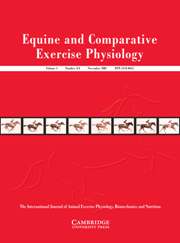Article contents
Changes in plasma cortisol and ascorbic acid in horses with and without recurrent airway obstruction upon exercise and ascorbic acid supplementation
Published online by Cambridge University Press: 09 March 2007
Abstract
Diminished basal plasma cortisol concentrations and a blunted cortisol response to exercise have been observed in human asthmatics. In horses with recurrent airway obstruction (RAO), plasma concentrations of cortisol at rest are not significantly different from those of healthy horses, but the effect of exercise on endogenous cortisol concentrations has not been described. Ascorbic acid is a non-enzymatic antioxidant with proposed immune-modulating properties. In man, supplementation with ascorbic acid has been shown to attenuate the exercise-induced increase in plasma cortisol following prolonged, submaximal exercise. The relationship between cortisol and ascorbic acid has not previously been investigated in the horse. In a blinded cross-over design, five horses with RAO and six healthy non-RAO controls performed a standard exercise test following 4 weeks of supplementation with either an antioxidant (providing 10 mg ascorbic acid kg−1 day−1) or a placebo (<1 mg ascorbic acid kg−1 day−1). Venous blood samples were obtained 1 h prior to exercise and at 0, 15, 60 min and 24 h thereafter. Exercise resulted in a significant increase in plasma cortisol concentrations in both groups of horses (P<0.05). Basal and post-exercise concentrations of plasma cortisol in the RAO group (136±16 and 210±16 μmol l−1, respectively) were not significantly different from those in the non-RAO group (129±43 and 218±30 μmol l−1, respectively). Antioxidant supplementation increased basal and post-exercise concentrations of plasma ascorbic acid in RAO and non-RAO horses (P<0.05) but had no effect on plasma cortisol concentration in either group, before or after exercise (RAO: rest 157±27 μmol l−1, post-exercise 222±21 μmol l−1; non-RAO: rest 140±11 μmol l−1, post-exercise 227±35 μmol l−1). In conclusion, RAO-affected horses in remission demonstrate the same cortisol response to exercise as healthy controls. Antioxidant supplementation had no impact on post-exercise concentrations of plasma cortisol in either healthy or RAO-affected horses in remission.
Keywords
- Type
- Research Article
- Information
- Copyright
- Copyright © Cambridge University Press 2005
References
- 3
- Cited by


